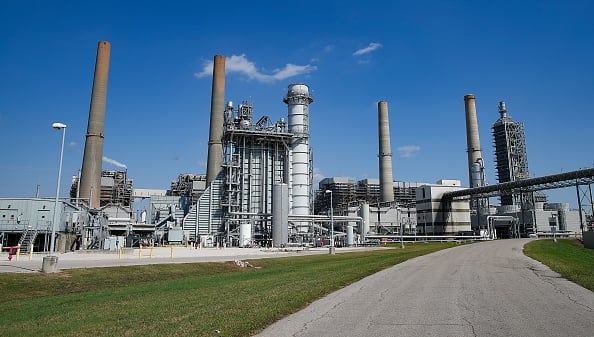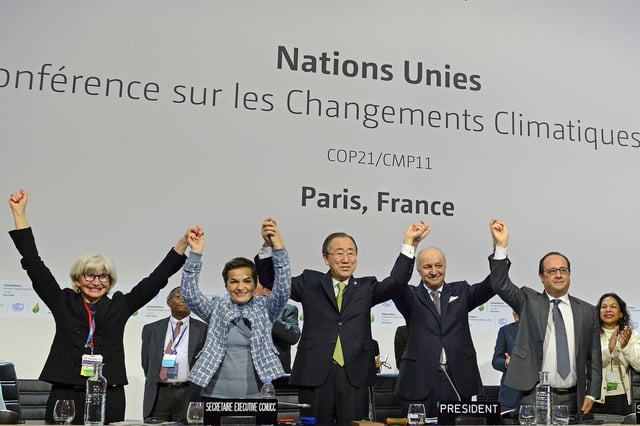
This story was supported by the Pulitzer Center.
Last spring, the National Ocean Industries Association (NOIA), a trade organization representing offshore oil and gas producers, made a startling claim: Producing more oil in the Gulf of Mexico can help “[drive] climate progress forward.”
To support that claim, NOIA cited a new report by ICF, a multinational consultancy known for its rigorous technical analyses on climate and energy topics, in addition to working in healthcare, education, and other sectors. This report, which NOIA hired ICF to write, looked at the emissions associated with producing a barrel of oil in the Gulf and compared them with the emissions tied to oil production in other parts of the world. Wells in the Gulf, ICF found, have relatively high productivity and lower methane emissions compared to others around the world.
ICF did not make any policy recommendations based on these findings—in fact, a disclaimer at the top of the report states that the “non-partisan, non-political” firm doesn’t take advocacy positions at all. But the group that paid for the report had a clear takeaway: policymakers should embrace Gulf of Mexico oil production as a “climate-smart” way of meeting America’s energy needs, as NOIA president Erik Melito put it in a blog post reviewing the ICF report’s findings last May.
A report like this might give the impression that ICF is merely a clearinghouse for fossil fuel industry talking points. But ICF is a respected consultancy with serious environmental credentials that plays a key role in implementing the US climate and energy agenda. For decades, ICF has worked with the Environmental Protection Agency on important technical reports like its annual greenhouse gas inventory. ICF also administers key federal climate and energy programs for the EPA and the Department of Energy. States that are leading the way on climate action also rely on ICF’s technical expertise: They contributed to and reviewed New York’s energy chapter of a statewide climate assessment and prepared an affordability study that will inform the state’s forthcoming cap-and-invest plan. ICF consultants have even helped coordinate and co-author the National Climate Assessment, an authoritative federal government report on how climate change is impacting every corner of the nation.
But while ICF touts this climate-positive work on its website and in corporate reports, an investigation by Drilled found that the firm also works for pro-fossil fuel lobbying groups like NOIA, the American Gas Association, and the American Petroleum Institute. These organizations have paid ICF contractors hundreds of thousands of dollars for their services since 2018, according to publicly available tax filings. The end result is technical reports that the industry can use to fight decarbonization efforts, greenwash oil and gas, or provide credibility to climate “solutions” that do little more than extend the life of the fossil fuel industry.
Lauren Dyke, head of media relations at ICF, told Drilled that in 2023, less than 0.1 percent of the firm’s overall revenue of nearly $2 billion came “fossil fuel producers, subsidiaries, and related industry associations,” calling it a “negligible amount.” ICF, Dyke told Drilled, is “a highly credible provider of independent, objective, science-based expertise, analysis and insight.” Dyke stressed that the consultancy “does not take policy positions” and that “[a]ny decisions to assign interpretations to our analysis are exclusively the domain of our clients.”
But outside experts contacted by Drilled felt that the image of objectivity ICF works hard to cultivate is part of what makes its work for fossil fuel trade organizations so problematic. An explicit part of the gas industry’s strategy for building its own political influence is to partner with credible consultancies. When it’s able to hire those consultancies to generate reports that support industry policy positions, “it muddies the waters of what’s real and what’s not,” said Julie McNamara, a climate and energy policy director at the Union of Concerned Scientists.
“Analyses are only as good as the questions being asked and the assumptions being employed,” Julie McNamara said. “To me that’s one of the most insidious things about an organization that will simultaneously do [reports] for fossil fuel lobby groups on the one hand and state policy implementation on the other. ”
For more on this story, check out the corresponding podcast episode here:
ICF’s recent report for NOIA illustrates McNamara’s point. While the report’s topline conclusion—that oil from the Gulf is less emissions-intensive than oil produced elsewhere in the world—may be backed up by solid numbers, the analysis focused solely on emissions associated with oil production while ignoring the (much larger) emissions tied to its use. This “deceives the audience about the degree to which [greenhouse gas]emissions are actually less,” Donald Boesch, a professor emeritus at the University of Maryland Center for Environmental Science, told Drilled. Boesch pointed out that expanding oil production in the Gulf would undermine the Paris Agreement goal of limiting warming to 1.5 degrees Celsius, which requires eliminating global carbon emissions by 2050. Yet after the report was published, NOIA, and Republican members of Congress, called for doing exactly that.
In the past five years, ICF has produced other reports for fossil fuel lobby groups that highlight industry-favored climate solutions, such as replacing the fossil gas in today’s pipelines with so-called “renewable natural gas” (RNG) made from waste methane from things like animal manure, and expanding the production of “blue hydrogen,” or hydrogen produced by burning fossil gas. Both blue hydrogen and RNG are frequently touted by the fossil fuel industry as low-carbon fuels that perpetuate the use of gas and gas pipelines, although independent, peer-reviewed analyses raise serious doubts about whether either would be effective at reducing carbon emissions on a large scale.
ICF also conducted the analysis behind a 2021 American Gas Association report that outlines four different “pathways” the gas industry can follow to achieve net zero emissions by 2050. By doing things like increasing the energy efficiency of buildings, reducing methane leaks, and expanding production of RNG and hydrogen, the report concludes that the gas industry can, in theory, cancel out its emissions by mid-century. The report did not attempt to calculate the cost of its different pathways or compare them to a scenario in which the country embraces renewable energy technologies like wind and solar. Nevertheless, AGA has touted the report’s findings as proof that the gas industry “will be essential to meeting our nation’s greenhouse gas emissions reduction goals.”
Emilia Piziak, a senior policy analyst at the climate change think tank InfluenceMap, says she’s seen AGA repeatedly cite the 2021 report in comments to lawmakers, regulators, and business leaders, “to the point where it's rare to find any written comments without it.” Piziak said AGA also routinely cites a series of case studies branching off a 2018 report it paid ICF to prepare in comments opposing building electrification measures. The 2018 report warns that residential electrification mandates would cause ratepayers’ utility bills to balloon.
As Dyke of ICF emphasized in a statement to Drilled, reports like these constitute a small part of ICF’s overall revenue. The firm’s “largest areas of work,” Dyke said, include partnering with utilities to implement energy efficiency programs, and working with federal, state, and local governments on energy efficiency and decarbonization plans.
Even so, ICF’s fossil fuel industry work may be helping the firm attract other clients—including government agencies who want similar analyses done.
In 2020, the New York State Energy Research and Development Authority, or NYSERDA, directed ICF to produce a report on statewide RNG production potential that would inform policymakers about the role RNG could play in meeting New York’s climate goals. The senior consultant, former ICF staffer Maurice Oldham, includes a link to a 2019 RNG report for the pro-gas lobbying group American Gas Foundation as one of his “key contributions” in his role at ICF on his LinkedIn page. ICF Director of Transportation and Energy Philip Sheehy, whose official bio states that he led the American Gas Foundation report, also participated in the NYSERDA project, according to a copy of ICF’s contract with the agency that Drilled obtained via a state records request.
In the gas industry report from 2019, ICF examined nationwide RNG production potential by creating a state-by-state database of different potential feedstocks. In its New York state contract, NYSERDA directs ICF to “draw from that work [for the American Gas Foundation] and augment the database for this project with on-the-ground and local information.” A NYSERDA spokesperson declined to say how exactly the gas industry report informed its statewide RNG study, but noted that with every analysis, “NYSERDA staff apply their subject matter expertise and analytical training to a project’s overall structure and format, the inputs and research design, data assessment and examination of analysis or modeling results.”
NYSERDA’s final report, published in April 2022, suggests that by 2040, RNG could offset up to about 11% of the state’s 2017 natural gas usage. Robert Howarth, a professor of ecology at Cornell University and a member of the New York State Climate Action Council, which helps craft state climate policy, called this figure “very, very optimistic.” A separate analysis Howarth conducted found that RNG could potentially replace up to 2.6 percent of the state’s fossil gas usage. Ultimately, New York’s “Scoping Plan” scenarios for how it will reduce greenhouse gas emissions wound up relying on RNG for just 2% of its 2050 energy needs, a NYSERDA spokesperson said.
A former ICF staffer who worked on climate and energy issues at the firm told Drilled that it wasn’t unusual for industry clients and government agencies to contract ICF to conduct similar studies, oftentimes using the same modeling tools. In some cases, the former staffer said, the client would define the scenarios being modeled.
“But in that case…it would be very clearly stated in that way,” said the former staffer, adding that ICF tried to be “very cautious” to ensure that when a client made a decision that shaped a study, or if a client had a policy takeaway from ICF’s analysis, that was clearly disclosed.
“They were always trying to be the neutral party,” the former staffer said.
But how much consultancies like ICF can really distance themselves from the climate implications of their work is a matter of growing debate. As the role of consultancies in shaping climate and energy policy gains scrutiny, some members of the industry and civil society want to see these firms take more ownership over the impacts of their services for fossil fuel clients—whether it’s the kinds of investments a gas utility decides to make based on a consultant’s advice, or the political consequences of a report that can be used to lobby against climate action.
“The main barrier is that this is not really being discussed—this idea of your influence having a material impact,” said Alexis McGivern, a climate researcher at the University of Oxford.
McGivern co-chairs a working group for the global climate action campaign Race to Zero that’s developing best practice guidance for professional service providers, including consultancies, law firms, and ad agencies, that are interested in aligning their businesses with a net zero emissions future. In late 2023, the group published a paper laying out a draft set of guidelines on “serviced emissions,” or the emissions associated with a firm’s client work. These emissions aren’t covered by the Greenhouse Gas Protocol that many firms across many industries, including ICF, use to track their own carbon footprint. But for professional service providers, they are likely the “most significant” piece of the pie, according to the paper.
Race to Zero’s guidelines include creating an inventory of serviced emissions by mapping clients and projects, considering climate impacts when screening new clients and projects, encouraging clients to lobby for positive climate action, and “plan[ning] for the decline” of high carbon industries. McGivern was careful to note this last recommendation does not mean firms like ICF must sever all ties with the fossil fuel industry—an idea she says consultancies that offered input on the guidelines pushed back against—but that they should focus on projects that help the industry reduce its emissions or transition to renewables.
Dyke told Drilled that ICF had “no comment” on the working paper’s proposals but was confident that “any credible, measurable analysis of emissions related to ICF’s work with its clients would underscore the massive amount of GHG and carbon reductions we have achieved together.”
McGivern acknowledged that reports ostensibly focused on climate solutions, like RNG or blue hydrogen are “a bit of a gray space,” especially when they are used by industry to lobby against climate action. A common refrain from the consultancies McGivern spoke with was “we just wrote this report…and it got taken completely out” of context.
“Part of that might be true,” McGivern said. “And then partly I think it’s like, ‘you’re not an idiot—you can figure it out.’”
This is the second story in our series looking at how the fossil fuel industry sells false solutions. Check out the first story—on the “greening” of LNG—here.




